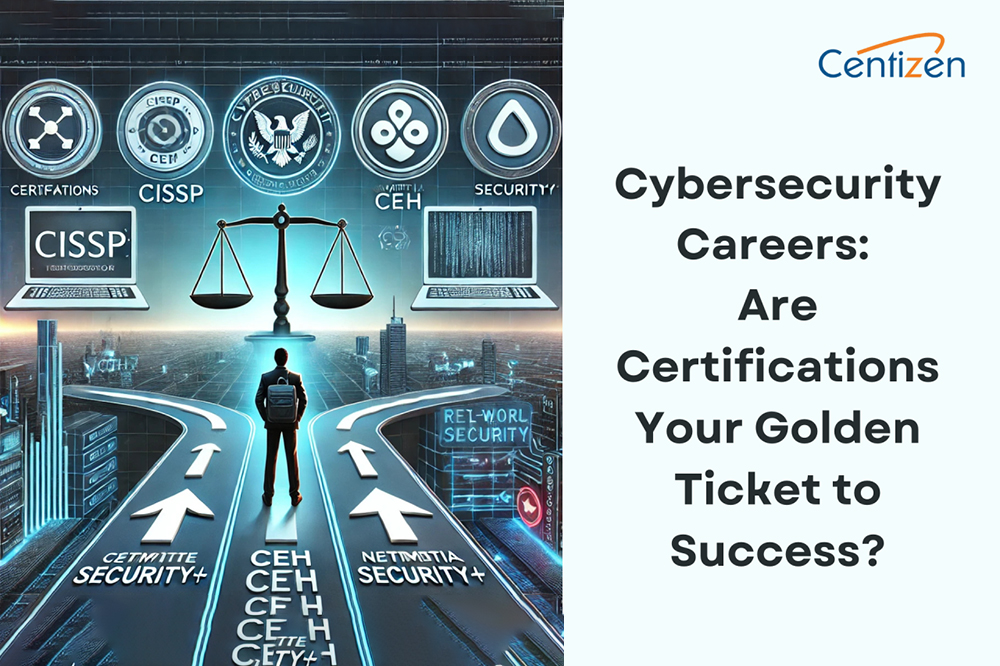Cybersecurity Careers: Are Certifications Your Golden Ticket to Success?

1. Introduction
Cybersecurity is one of the fastest-growing fields in the tech industry, with companies continually looking for skilled professionals to protect their systems from cyber threats. However, with the increasing popularity of certifications like CISSP, CEH, CompTIA Security+, and others, many aspiring cybersecurity professionals wonder whether they truly need these certifications to land a job.
In this article, we’ll break down the importance of certifications in the cybersecurity field, the pros and cons of obtaining them, and whether they are genuinely necessary to kickstart your career.
2. The value of cybersecurity certifications
a) Demonstrating knowledge and skills:
- Certifications serve as a quick way for employers to gauge your technical skills and knowledge.
- They provide standardized proof that you understand fundamental cybersecurity concepts and practices.
b) Industry recognition:
- Many certifications, like CISSP or CEH, are globally recognized and valued by top employers.
- Holding these certifications shows a commitment to professional development and a dedication to staying current in the field.
c) Competitive advantage:
- In a crowded job market, having certifications can give you an edge over candidates without them.
- Certifications may also qualify you for higher-paying positions or roles with increased responsibilities.
3. The drawbacks of cybersecurity certifications
a) Cost and time commitment:
- Many certifications are expensive, with exam fees ranging from a few hundred to several thousand dollars.
- Preparation can take weeks or even months, and some certifications require ongoing education to maintain.
b) Real-world experience gap:
- Certifications alone may not be enough if you lack practical, hands-on experience.
- Employers often prefer candidates with both certifications and proven experience in the field.
c) Outdated information:
- Cybersecurity is a rapidly evolving field, and some certifications may become outdated.
- Staying certified requires continual education and renewal, which can be both time-consuming and costly.
4. Real-world experience: The unspoken requirement
While certifications can boost your resume, real-world experience often carries more weight. Employers value candidates who can demonstrate problem-solving skills and practical knowledge, which may not always be evident through certifications alone.
Ways to gain practical experience:
- Participate in Capture the Flag (CTF) competitions.
- Volunteer for cybersecurity roles in community projects.
- Take on internships to gain hands-on experience.
- Build your own home lab to practice penetration testing and network security.
5. When certifications are essential
While certifications may not be mandatory for entry-level positions, they can become crucial as you progress to mid or senior-level roles. Here are some scenarios where certifications are often required:
a) Compliance and regulation roles:
- Certain jobs in finance, healthcare, or government may mandate certifications to meet legal or regulatory requirements.
b) Specialized roles:
- Penetration testers, ethical hackers, and security analysts may need certifications like CEH or OSCP.
c) Career advancement:
- Promotions or senior-level positions often require certifications to demonstrate advanced knowledge and competence.
6. Alternative pathways to a cybersecurity career
If certifications are not feasible or appealing, there are alternative ways to build a successful career:
a) Skill-based learning:
- Free or low-cost online courses can teach essential skills without the financial burden of certification.
- Platforms like Coursera, Udemy, and CyberSecLabs offer hands-on labs and projects.
b) Personal projects:
- Create and secure your own websites or networks to showcase your abilities.
- Share your achievements and case studies on LinkedIn or GitHub.
c) Networking and mentorship:
- Join cybersecurity communities to connect with professionals and gain insights.
- Find a mentor who can guide you through career decisions and skill-building.
7. The bottom line: Are certifications worth it?
The answer to whether cybersecurity certifications are essential largely depends on your career goals and current skill level. While certifications can boost your resume and open doors to new opportunities, they are not a substitute for hands-on experience and practical skills.
For entry-level roles, focusing on foundational skills and real-world projects might be more valuable. As you move to higher positions, consider certifications to bolster your expertise and credibility.
8. Final thoughts
Certifications can be a powerful tool in your cybersecurity career, but they are just one piece of the puzzle. Striking a balance between formal education, hands-on experience, and certifications is key to success. Take the time to evaluate your career goals, budget, and time availability before investing in a certification.
No matter your path, remember that continuous learning and practical application are the true pillars of success in the ever-changing world of cybersecurity.
Our services:
- Staffing: Contract, contract-to-hire, direct hire, remote global hiring, SOW projects, and managed services.
- Remote hiring: Hire full-time IT professionals from our India-based talent network.
- Custom software development: Web/Mobile Development, UI/UX Design, QA & Automation, API Integration, DevOps, and Product Development.
Our products:
- ZenBasket: A customizable ecommerce platform.
- Zenyo payroll: Automated payroll processing for India.
- Zenyo workforce: Streamlined HR and productivity tools.
Services
Send Us Email
contact@centizen.com
Centizen
A Leading Staffing, Custom Software and SaaS Product Development company founded in 2003. We offer a wide range of scalable, innovative IT Staffing and Software Development Solutions.
Call Us
India: +91 63807-80156
USA & Canada: +1 (971) 420-1700
Send Us Email
contact@centizen.com
Centizen
A Leading Staffing, Custom Software and SaaS Product Development company founded in 2003. We offer a wide range of scalable, innovative IT Staffing and Software Development Solutions.
Call Us
India: +91 63807-80156
USA & Canada: +1 (971) 420-1700
Send Us Email
contact@centizen.com






